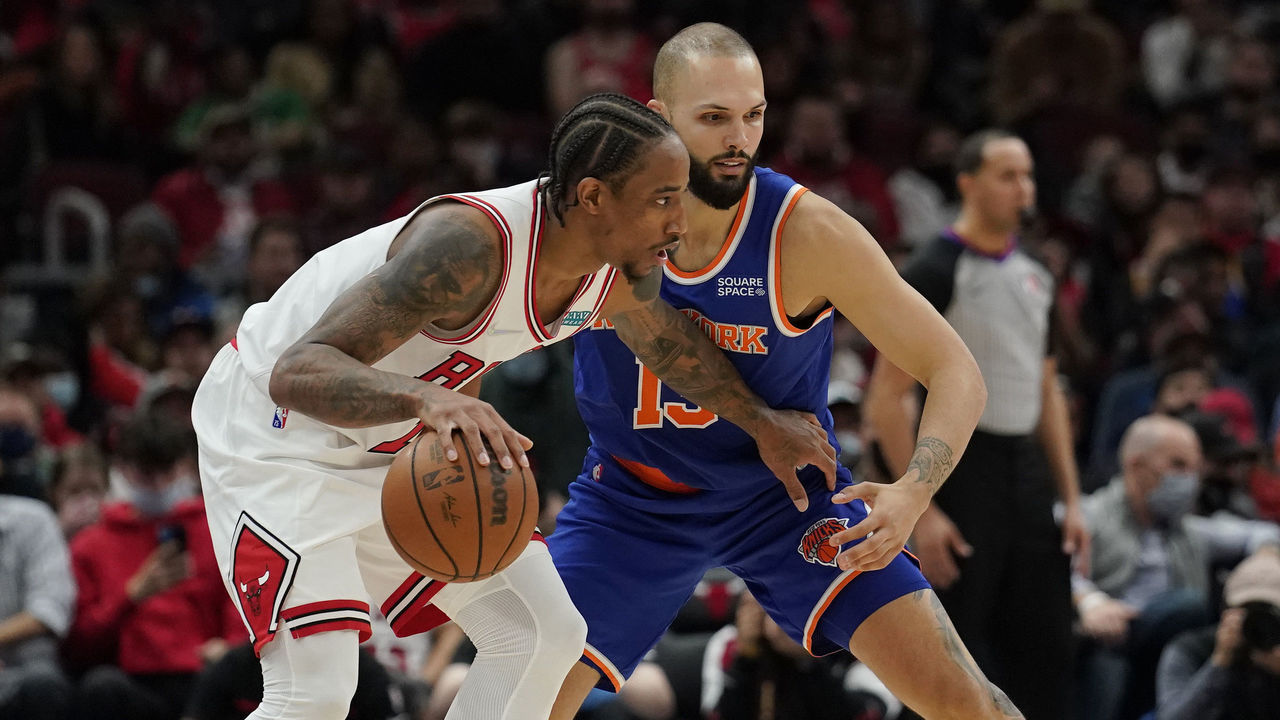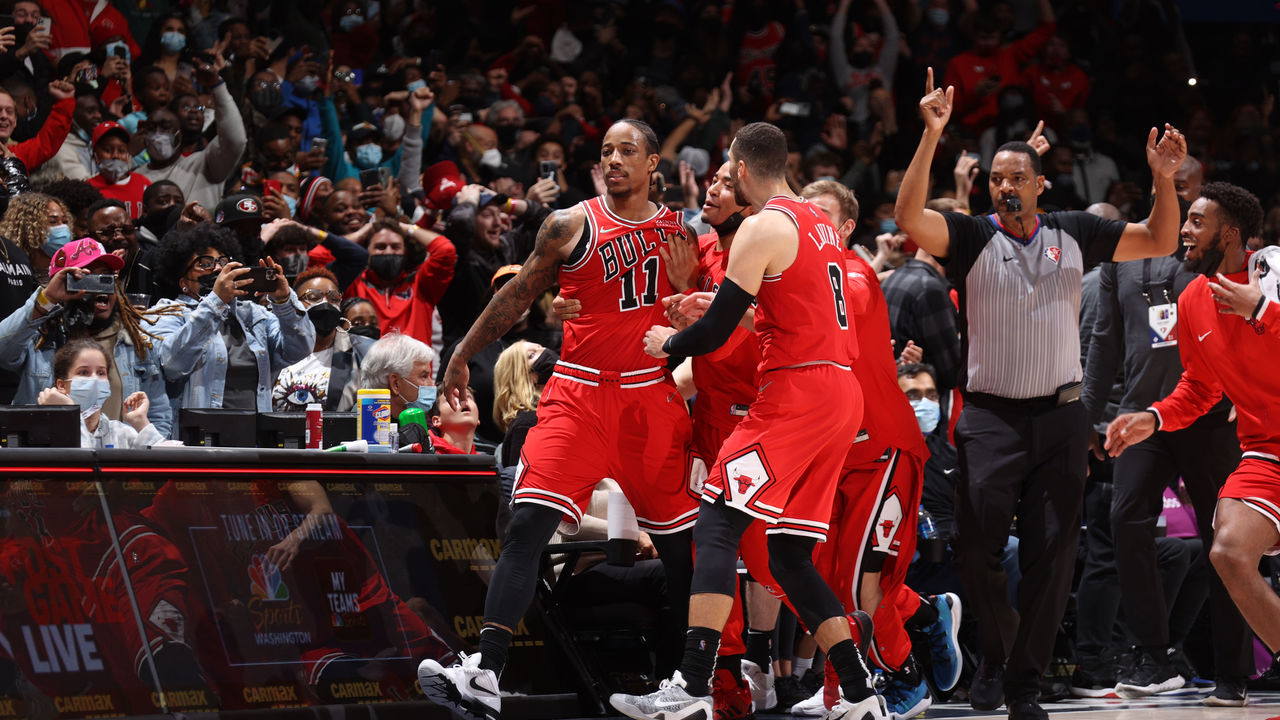Why this version of DeMar DeRozan is more playoff-proof
The play of DeMar DeRozan and the new-look Chicago Bulls has been one of the most entertaining developments of the season's first half, aided by the fact DeRozan's career year has included plenty of late-game heroics.
But celebrating DeRozan's success in Chicago so far has also come with big-picture questions about the sustainability and postseason viability of his play; DeRozan's underwhelming efficiency, effectiveness, and team success as a playoff performer in years past is still fresh in skeptics' minds.
But how sensible is it to use the 2018 version of DeRozan as an argument against his (and Chicago's) chances in 2022?
The 32-year-old is a much more complete offensive player today than he was the last time he and his team crashed and burned out of the postseason, and the personnel around him are better equipped to protect him.
Same, but different
DeRozan's converting his 3-point attempts at a roughly league-average level (35.2%) for the first time in his 13-year career, and both of his unprecedented, back-to-back, buzzer-beating, game-winners were threes, but he's still making less than one triple per game. In that sense, his shooting and range haven't expanded much.
What DeRozan has done is double down on the throwback offensive arsenal that got him into trouble in the past. He's just doing it better.
For years, DeRozan's mid-range-heavy shot diet suppressed his efficiency, but the soon to be five-time All-Star has perfected his craft - he's an assassin inside the arc and in the post. His ever-improving skill set is a clear homage to mentor Kobe Bryant; a symphony of flawless footwork, craftiness, and precision.
Of the 50 players who've attempted at least 100 shots from the non-restricted area of the paint, DeRozan ranks 10th in efficiency. He's taken 63 more mid-range shots than anyone else in the league, yet has still been more efficient from that zone than Devin Booker, Paul George, and Khris Middleton.
His shooting from 10-16 feet will likely cool off somewhat given his career numbers, but he'd already improved his efficiency from that distance over the last couple years, so any drop-off shouldn't be too drastic or debilitating.
Good defenses - the kind often encountered in the playoffs - tend to surrender mid-range looks more frequently than they do shots from more offensively advantageous areas. DeRozan is more capable of making defenses pay for that strategy than he was in his Toronto days, when that meant playing into those defenses' hands.
It's also worth noting that though DeRozan's Spurs lost in seven games to Nikola Jokic's Nuggets, DeMar's last playoff trip (in 2019) was his most efficient postseason to date.

His wily craftsmanship - and mean pump-fake - have also helped him continue to parade to the free-throw line despite a well-documented decrease in shooting fouls this season. Like many of the league's offensive stars, DeRozan has seen his free-throw attempt rate slide, but he's still earning more than 40 free-throw attempts per 100 field-goal attempts. That's better than the regular-season rates he posted in his final season as a Raptor and his first season as a Spur, which represent his last two playoff trips.
Point DeMar
The most significant area of development for DeRozan over the last four-ish years has been his playmaking. After taking on more playmaking duties in his final year as a Raptor, DeRozan led the Spurs in assists each of his three seasons in San Antonio, becoming a much more capable offensive initiator. This season, he trails Lonzo Ball by only three dimes for the Bulls' team lead. Since his last postseason trip in 2019, DeRozan ranks 14th in total assists in the NBA.
While it remains true he needs the ball in his hands to be effective (though he has shown modest improvements as an off-ball threat in Chicago), the number of ways DeRozan can impact a game with the ball in his hands has multiplied over the last few years. How do you stop a bigger guard with great court vision, who also scores as efficiently in the pick-and-roll as Trae Young and Damian Lillard?
DeRozan's also posting the lowest turnover rate of his career, which is even more impressive when you consider how often the ball's in his hands, and how heavy his offensive burden is.
DeRozan currently owns a usage rate above 31% and an assist percentage above 22%, yet he's turning the ball over on fewer than 9% of his possessions. To put that combination of offensive involvement and care into perspective, no player's done that since Kobe 16 years ago, with Michael Jordan, Tracy McGrady, and Vince Carter the only others to have done it at all.

The supporting cast around DeRozan deserves credit for helping him become the best version of himself. It should also make his production more playoff-proof.
DeRozan spent his formative years with Kyle Lowry - an NBA champion and future Hall of Famer - but DeMar's never had a dynamic scorer like Zach LaVine beside him. Nikola Vucevic is also the most skilled offensive big DeRozan's played with (though Vucevic's offensive efficiency has slipped this season).
And while Lowry's a great defensive guard, DeRozan's never had a combination of perimeter defenders around him quite like Alex Caruso and Ball. Teams will still target and attack DeRozan's defense in the playoffs, where weaknesses are exposed more than strengths are accentuated, but Chicago is uniquely equipped to minimize the damage.
The way DeRozan and this Bulls' roster complement each other could help explain why his on-court impact is at its highest.
The Raptors often performed better when DeRozan was on the bench, thanks to perennially strong reserve units, and won a championship in his first year out of town, thanks in large part to Kawhi Leonard, who DeRozan was traded for.
That trend held steady in San Antonio, but DeRozan's impact in Chicago is in line with other MVP candidates.
Nearly halfway through the season, the Bulls - on pace for 57 wins - sit atop the Eastern Conference. They own a top-five offense, and though their defense has recently regressed, they still boast underlying metrics that indicate they're closer to contender than pretender.
None of that means the Bulls are guaranteed playoff success, though - the East is better and deeper than it's been in 25 years. Chicago could lose to Brooklyn, Milwaukee, Miami, or even a post-trade version of Philadelphia, all within the postseason's first two rounds. Maybe the Bulls' lack of size or shooting - Chicago ranks first in 3-point percentage but last in attempts - will come back to bite them.
In any event, if DeRozan and the Bulls ultimately come up short, it'll likely be because they ran into a better team, not because DeRozan reverted to a lesser version of himself, one we haven't seen in four years.
Joseph Casciaro is theScore's senior basketball writer